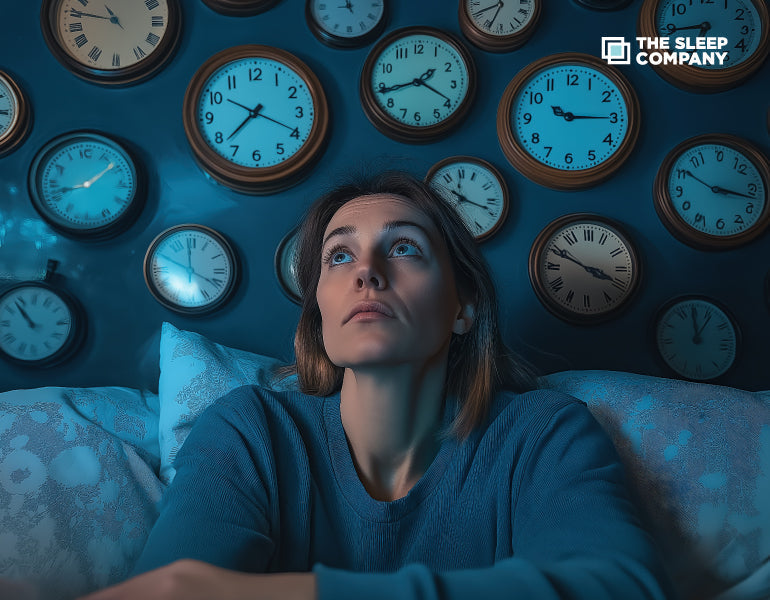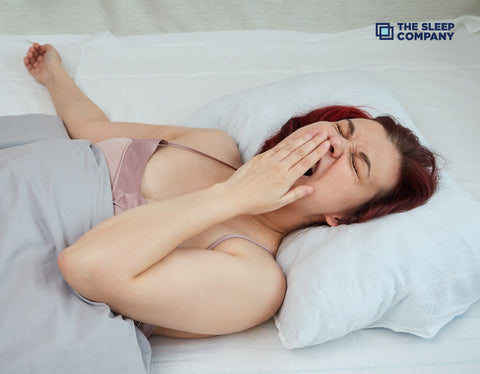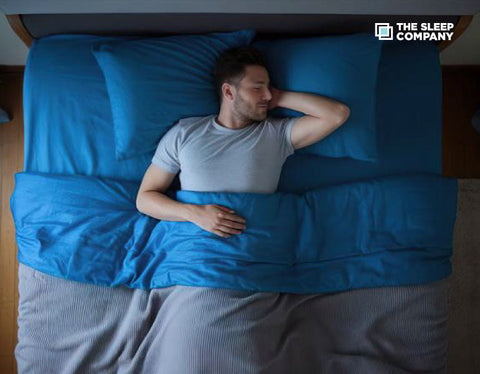My Cart

Common Causes of Insomnia: Stress, Anxiety, and Other Triggers

Today, about 30% of the Indian population has insomnia.
Now, a good night's rest is not only about waking up energetic and productive. But, it is also crucial for your mental and physical health.
As an adult, you need anywhere between 7 to 9 hours of sleep each night. However, when you suffer from insomnia, it can disrupt the amount of slumber you get.
And, not all types of insomnia are the same. It can differ from person to person and based on the cause. Therefore, understanding the reasons for insomnia is the first step to dealing with the disorder.
Ahead, let's unpack everything you must know about insomnia, management tips, and more.
What Is Insomnia?
Insomnia is a sleep disorder where you find it extremely difficult to fall or stay asleep. In fact, enjoying quality sleep also becomes cumbersome. So, you may feel tired, irritable, or less focused most of the time.
That said, occasional sleepiness should not be confused with insomnia.
If you are worried about insomnia, don’t be. It is a common condition and can be easily treated. Most people experience this sleep disorder due to stress, lifestyle changes, or health issues.
Types of Insomnia
There's no one-size-fits-all when it comes to insomnia. Therefore, before finding a cure, it is essential to understand the type of insomnia you have.

1. Acute Insomnia
Sometimes, major life changes, an illness, or stress can impact your sleep. But this sleep issue tends to go away on its own in a few days. This is known as acute insomnia.
2. Chronic Insomnia
This is a long-term insomnia that occurs more than three times a week and can last for months. Here, you must try management techniques to overcome the sleep disorder. If nothing works, speaking to your doctor becomes imperative.
3. Sleep Onset Insomnia
Here, you may face difficulty falling asleep, which is generally due to stress, anxiety, or stimulants like caffeine.
4. Sleep Maintenance Insomnia
This is when you have trouble staying asleep and tend to wake up frequently during the night. You may also find it diffic
Symptoms of Insomnia

Now, let’s understand the symptoms of insomnia.
- You may find it difficult to fall asleep at night.
- You may wake up frequently during the night.
- You may wake up too early and not be able to fall back asleep.
- You may feel excessively tired or unrefreshed when you wake up.
- You may experience daytime fatigue, irritability, or mood changes.
- It can be difficult for you to concentrate or remember things.
- There may be an increase in stress or anxiety related to sleep.
Causes of Insomnia
In most cases, there’s a reason behind your insomnia. When you figure out these main causes of insomnia, you have taken the first step in the right direction.

1. Stress and Anxiety
Our minds cannot handle too much stress. Any major life event, work pressure, or issues with relationships can lead to overthinking. This keeps the mind active even when it's time for bed. And, if you are suffering from chronic stress, it can further aggravate your insomnia and lead to long-term sleep disorders.
2. Medications
Certain medications, including antidepressants, stimulants, and blood pressure drugs, can interfere with sleep. Side effects like increased alertness or restlessness may make it difficult to fall or stay asleep.
3. Hormonal Changes
Hormonal fluctuations, especially during pregnancy, menopause, or menstruation, can lead to insomnia. Changes in hormones like estrogen and progesterone can affect the body’s sleep-wake cycle.
4. Food Habits
It is important to pay attention to what you eat and drink. For instance, a heavy and spicy meal at night can disrupt sleep. Whereas, consuming caffeine late in the evening can make it difficult to fall asleep.
5. Depression
One of the main causes of insomnia is depression. With this condition, you may find it difficult to fall or stay asleep, and it also leads to restless nights. Depression even hampers your internal clock, which regulates your sleep-wake cycle.
6. Poor Sleep Hygiene
Another common cause of insomnia is poor sleep hygiene. Unknowingly, these habits contribute to poor sleep and reduce its quality. That's why a calming sleep routine is essential.
Some of the poor sleep hygiene habits include:
- Not having a set sleep schedule
- Spending too much time on phones or tablets before bed
- A poor-quality mattress that's unable to support you
- Uncomfortable sleep environment like a warm or noisy room
- Indulging in excessive mental stimulation
7. Medical Conditions
Health issues like arthritis, chronic pain, or diabetes can be the reason that you are experiencing sleep problems. These health issues cause frequent waking or difficulty falling asleep due to physical discomfort.
8. Family History
It is seen that sleep problems at night can also be genetic. So, if you have noticed a family history of insomnia, this can be the reason why you are going through the same.
How to Identify Causes of Insomnia?
If you are not very sure about the causes of your sleep problems, it is best to start tracking your sleep patterns. You can keep a sleep diary where you make a note of everything—what you ate before bed, your caffeine intake, wake-up time, sleep disruptions, etc. Do this for a couple of weeks to identify patterns.
Also, pay attention to your mental health. Sometimes, stress may be causing sleepless nights without you even realizing it.
Tips to Manage Your Insomnia
Now that you are well aware of the main causes of insomnia, let’s understand how you can manage it effectively.

1. Learn to Relax
Stress, anxiety, and depression are significant contributors to insomnia. Therefore, it is crucial to learn to relax.
Make relaxation a part of your bedtime routine. Simple activities like meditation, deep breathing, or calming rituals such as listening to soothing music, taking a warm bath, or reading a book can help. Overcoming stress not only improves sleep but also enhances mood and productivity.
2. Build a Healthy Sleep Environment
A good sleep environment can make a big difference. Consider investing in a comfortable mattress and pillows, cozy bedding, and blackout curtains to block unwanted light. If noise is an issue, earplugs can help. Finally, ensure the room temperature is just right for you to sleep peacefully.
3. Medications
If natural remedies are ineffective, consult a doctor for appropriate medication. Options like melatonin supplements or sleeping pills might provide relief. Additionally, herbal supplements may regulate sleep patterns with fewer side effects. However, avoid dependency on medications.
4. Cognitive Therapy
Cognitive Behavioral Therapy for Insomnia (CBT-I) is an effective treatment for sleep issues. It helps change negative thoughts and behaviors associated with sleep. CBT-I allows you to identify and address the root causes of your insomnia, build better sleep habits, and reduce sleep-related anxiety.
Over time, CBT-I can help you develop healthier sleep patterns, reduce anxiety around sleep, and improve overall sleep quality without relying on medication.
5. Avoiding Stimulants Before Bed
Caffeine, nicotine, and certain medications can disrupt sleep. Caffeine is present in coffee, tea, chocolate, and some sodas and can stay in your system for hours. Similarly, smoking or vaping can interfere with your ability to relax. Consult your doctor about adjusting the timing of medications that might affect your sleep cycle.
6. Regular Exercise
Exercise offers multiple health benefits, including better sleep. Regular physical activity regulates your internal clock, making it easier to fall asleep. Endorphins produced during exercise can improve mood and relaxation. However, avoid exercising close to bedtime, as it may energize you and make sleep difficult.
7. Wake Up and Go to Bed at the Same Time
Maintain a consistent sleep schedule, even on weekends. A regular schedule aligns your body’s internal clock (circadian rhythm), improving the quality of your sleep. Avoid sleeping in or staying up late, as it can disrupt your rhythm and worsen insomnia.
8. Limit Naps
While short power naps (20–30 minutes) can recharge you, long naps, especially in the late afternoon or evening, can reduce your sleep drive, making it harder to fall asleep at night. If you need to nap, do so early in the day and keep it brief.
Wrapping Up
Insomnia is a common sleep problem that can be managed with the tips mentioned above. However, if these strategies don't work, consult a healthcare provider.
Start by ensuring you have a supportive and comfortable mattress for restful sleep. Sometimes, upgrading your mattress can significantly improve your sleep quality.
At The Sleep Company, we offer a range of premium mattresses and bedding options designed to provide the ultimate comfort and support. Choose The Sleep Company and enjoy the sleep you deserve!
FAQs
Stress, irregular sleep habits, poor diet, or health issues often lead to insomnia. External factors like noise, unstable mattresses, or light can also disrupt sleep.
Stress keeps your mind active, making it difficult to relax and fall asleep. It may also cause frequent wake-ups during the night, further disrupting sleep.
Caffeine is a stimulant that can disrupt your sleep cycle. Consuming coffee, tea, or chocolate close to bedtime can make it harder to fall asleep.
Late nights, irregular schedules, and excessive screen time confuse your body clock, making it difficult to maintain consistent sleep patterns.
Yes, heavy or spicy meals close to bedtime can lead to discomfort and disrupt sleep. Late-night eating may also trigger heartburn, making it hard to rest.
Yes, insomnia is often linked to conditions like anxiety and depression. It can be a sign of underlying mental health issues.




























































